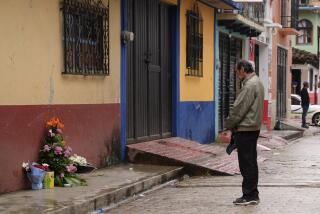Pontiff Urges Attention to Peru’s Violence, Terrorism
- Share via
LIMA, Peru — Pope John Paul II called on Peru’s Roman Catholic bishops Sunday to ensure that their pastoral work does not neglect the nation’s debilitating social ills, including chronic violence and terrorism that have claimed thousands of lives in recent years.
However, the Pope also reminded the bishops and other audiences during his 38-hour visit to this Andean nation that Catholics must shun forms of “liberation theology” that emphasize class struggle, materialism and other themes divorced from faith in Christ.
An estimated 30,000 police and soldiers mounted a vast security operation to protect the Pope and guard against attacks by left-wing guerrillas, who have accelerated their sabotage campaign in the past few weeks.
Saturday night, police arrested two suspected guerrillas, armed with rifles and posing as security force members along the route of the Pope’s motorcade, shortly before he was to pass by. Blackouts apparently caused by guerrilla attacks also darkened much of the city, although not in the areas where the Pope traveled after arriving here from Bolivia.
Peruvians looked to the Pope for words of hope at a time of desperate national problems. Economic decline has intensified, with inflation surging to 18% for the month of April alone and forecasts of 300% inflation for the year. The guerrilla war has claimed nearly 9,000 lives by official count since 1980, while unofficial estimates suggest that up to 15,000 have died. Sendero Luminoso (Shining Path), a secretive Maoist insurgent group, has broadened its violent campaign into downtown Lima from bases in the countryside.
In a welcoming address, President Alan Garcia appealed to John Paul to speak to the rebels “with your severe sweetness so that they might calm their hatred . . . and give us also the firm strength of democratic security to defend the people with the force of the law.”
Speaking to the bishops, John Paul said: “The civic life of Peru, beaten down for years by violence and terrorism, by poverty and drug-trafficking, the deterioration of public morals and other ills, cannot stay by any means at the margin of your work. The task of the bishops as creators of harmony and unity is the work of communion in your own country.”
Stresses Spiritual Message
In other speeches, however, the Pope avoided direct references to Peru’s manifold problems, choosing to concentrate on spiritual messages. In contrast to his first visit to Peru in 1985, when John Paul spoke directly about the spiraling violence, his speeches this time emphasized the need for greater evangelism during the approach of the 500th anniversary of the arrival of Christianity in South America.
A crowd estimated at more than 1 million people journeyed to a field on the edge of the city Sunday morning to hear the Pope’s outdoor Mass, passing through as many as a dozen security checks to reach the site. The Mass also marked the closing of a six-nation Eucharistic Congress.
Stressing a recurring theme of his visit, the Pope told the throng: “The alleviation of the misery of those who suffer should never be an excuse for neglecting or even undervaluing Jesus in the Eucharist.” He said that Catholics must “resist the temptation of an earthly messianism, the temptation to reduce the saving mission of the church to a liberation exclusively temporal.”
More to Read
Sign up for Essential California
The most important California stories and recommendations in your inbox every morning.
You may occasionally receive promotional content from the Los Angeles Times.










